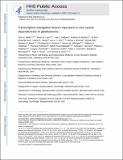Transcription elongation factors represent in vivo cancer dependencies in glioblastoma
Author(s)
Miller, Tyler E.; Liau, Brian B.; Wallace, Lisa C.; Morton, Andrew R.; Xie, Qi; Dixit, Deobrat; Factor, Daniel C.; Kim, Leo J. Y.; Morrow, James J.; Wu, Qiulian; Mack, Stephen C.; Hubert, Christopher G.; Gillespie, Shawn M.; Flavahan, William A.; Hoffmann, Thomas; Thummalapalli, Rohit; Paddison, Patrick J.; Horbinski, Craig M.; Zuber, Johannes; Scacheri, Peter C.; Bernstein, Bradley E.; Tesar, Paul J.; Rich, Jeremy N.; Hemann, Michael; ... Show more Show less
Downloadnihms882515.pdf (6.790Mb)
OPEN_ACCESS_POLICY
Open Access Policy
Creative Commons Attribution-Noncommercial-Share Alike
Terms of use
Metadata
Show full item recordAbstract
Glioblastoma is a universally lethal cancer with a median survival time of approximately 15 months. Despite substantial efforts to define druggable targets, there are no therapeutic options that notably extend the lifespan of patients with glioblastoma. While previous work has largely focused on in vitro cellular models, here we demonstrate a more physiologically relevant approach to target discovery in glioblastoma. We adapted pooled RNA interference (RNAi) screening technology for use in orthotopic patient-derived xenograft models, creating a high-throughput negative-selection screening platform in a functional in vivo tumour microenvironment. Using this approach, we performed parallel in vivo and in vitro screens and discovered that the chromatin and transcriptional regulators needed for cell survival in vivo are non-overlapping with those required in vitro. We identified transcription pause-release and elongation factors as one set of in vivo-specific cancer dependencies, and determined that these factors are necessary for enhancer-mediated transcriptional adaptations that enable cells to survive the tumour microenvironment. Our lead hit, JMJD6, mediates the upregulation of in vivo stress and stimulus response pathways through enhancer-mediated transcriptional pause-release, promoting cell survival specifically in vivo. Targeting JMJD6 or other identified elongation factors extends survival in orthotopic xenograft mouse models, suggesting that targeting transcription elongation machinery may be an effective therapeutic strategy for glioblastoma. More broadly, this study demonstrates the power of in vivo phenotypic screening to identify new classes of 'cancer dependencies' not identified by previous in vitro approaches, and could supply new opportunities for therapeutic intervention.
Date issued
2018-06-26Department
Massachusetts Institute of Technology. Department of BiologyJournal
Nature
Publisher
Springer Nature
Citation
Miller, Tyler E., et al. “Transcription Elongation Factors Represent in Vivo Cancer Dependencies in Glioblastoma.” Nature, vol. 547, no. 7663, July 2017, pp. 355–59.
Version: Author's final manuscript
ISSN
0028-0836
1476-4687